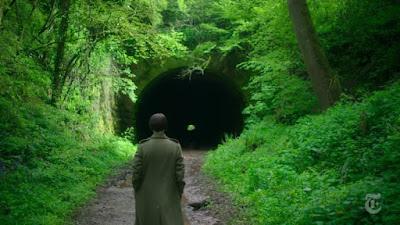Format: Blu-ray from DeKalb Public Library on rockin’ flatscreen.

I don’t always need to fully understand every movie I see, but I do want there to be some place where I feel like I am connected to the story and where I can understand what is happening. With Alex Garland’s Men, I don’t know that I ever really get there. This is a film that is highly allegorical and clearly allegorical, but is also pretty opaque. I’m happy to work at getting a meaning from something when I need to, but I really have to wonder if Men is worth the work I would need to put in to understand it.
The film is going to take a pretty roundabout way to tell its story, and we’re going to flashback a great deal, so I’ll smooth the path a bit here just so that what follows is a bit more linear. Harper (Jessie Buckley) has rented a house in the country in England to find a place for her to heal. Shortly before this, she had told her husband James (Paapa Essiedu) that she wanted a divorce, after which he told her that he would kill himself and it would be her fault. A fight ensued, he attacked her, and she kicked him out. Shortly thereafter, James forced his way into the apartment above and either intentionally or through misadventure, fell off the balcony to his death.
Things are strange immediately. Geoffrey (Rory Kinnear, who essentially plays all of the non-James men in the film) is odd, but this is easily put off as being just his odd personality. But soon after, Harper starts seeing a naked man in the garden surrounding the house, and eventually, the naked man tries to get in. When Harper calls the police, the man is taken into custody, but is eventually released, which Harper learns later than night. She also has an encounter with a strange boy (not the least of his strangeness is that he has Rory Kinnear’s face) and the local vicar who essentially tells her that it’s her fault that James killed himself.
Of course, all of these men are going to continue to attempt to force their way into Harper’s life in aggressive ways. And things are very quickly going to become something outside of reality. Lights shut off, people vanish and are replaced by others, and after a particularly violent moment with the naked man (who becomes more and more the incarnation of the Green Man as the film progresses), they all bear the same wounds, which mimic those of James when he fell to his death.
I’m going to focus for a moment on the things that Men does well. There are real moments of terror through this film. I would imagine that for many women, there are moments in Men that are triggering, as they feel like someone being stalked relentlessly and those stalkers being somehow beyond reproach and beyond suffering any consequences for his actions. Harper genuinely feels like, reacts like, and feels like she is in real danger. This feeling is enhanced by the surreal nature of many of the events around her.
Men is very good at creating that sense of existential dread that runs through the entire film from the moments we first see the naked man in the background of a scene to the bizarre conclusion. There is very much a sense here that the world of the film is slightly off-kilter that soon spins of into a world only lightly connected to reality. We start in a place of minor oddity and by the end of the film are in a completely new reality.
And that’s interesting, of course, but it’s also one of the major problems of Men. The world that we end up in is clearly one of allegory and is about Harper dealing with the pain and guilt of her husband’s death. Naturally, James is going to show up during her process of grief, and he is going to continue to accuse her of being the cause of his death, and this is a part of her process as well. But this process culminates in something violent and terrible, and ultimately something that is only hinted at during the credits.
The truth is that Men does some things really well, but because the ending is so impenetrable, it’s not easy to see what all of this is in service of. Is this about the fear that women rightfully have simply existing in the modern world? Is this about guilt and how easily manipulated we are by the demands of others? Is it about grief?
Years ago, another critic (come back to us, Squish!) said in his review of Meshes of the Afternoon that some people will see the auteur talk about the meaning of their film and consider that interesting, but his question is why they didn’t put that meaning in the film itself. With Men, I have a similar reaction.
Why to watch Men: It has moments of really distressing terror.
Why not to watch: It makes as much sense as a lemon-flavored suppository.
